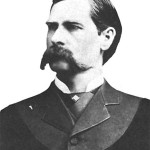Weekly Wrap Volume 67
 Wyatt Earp, the Great American… Villain?
Wyatt Earp, the Great American… Villain?
The history books (and Hollywood) often describe the famous lawman, Wyatt Earp, as many things: brave, courageous, moral, law-abiding, and honorable. In the story of the “Gunfight at the OK Corral,” Earp is often portrayed as the hero, the good guy we all should be rooting for. In truth, Wyatt Earp was a much more complicated individual who, among other things, was arrested several times in his life for various offenses, involved in a few major scandals (sometimes on the “bad guy” side), and otherwise seemed to be an individual who balanced precariously on that line between a life as a criminal and a life as a lawman. Wyatt Earp was… (more)
There is an often expressed notion that “Xmas” is a relatively new non-religious name / spelling for “Christmas.” However, it turns out, this isn’t the case at all, at least not originally. The “X” originally indicated the Greek letter “Chi,” which is short for the Greek![]() , meaning “Christ.” So “Xmas” and “Christmas” were equivalent in every way except their lettering. So when did this substitution start?… (more)
, meaning “Christ.” So “Xmas” and “Christmas” were equivalent in every way except their lettering. So when did this substitution start?… (more)
That “new car smell” is romanticized and beloved by many people. In fact, it is so desired that there is even an air freshener that is scented as “new car smell. ” But what produces this distinct scent and are the chemicals involved bad for you? The new car smell is actually a variety of smells mixed together that vary somewhat from car to car, depending on the materials used in the car. As for a general umbrella term, the smell results from the release, or “offgassing/outgassing,” of various volatile organic compounds (VOCs). Due to low boiling points… (more)
 The First Computer Program, Written in 1842
The First Computer Program, Written in 1842
Ada Lovelace was born on December 10, 1815 and was the only legitimate daughter of Lord Byron. She never knew her father as he had left England for good in her early years and he died when she was 9 years old. Lovelace was initially taught mathematics, something which was not typical for women of the age, due to the fact that her mother was trying to drive out any insanity that may have come from Lord Byron. Ada showed an aptitude for math and science and one of her later tutors, the famous mathematician and logician Augustus De Morgan, noted that her exceptional skill in mathematics might someday lead her to become “an original mathematical investigator, perhaps of… (more)
 Why a Dollar is Also Called a “Buck”
Why a Dollar is Also Called a “Buck”
As with many etymologies, the exact root of this word is difficult to say with one hundred percent certainty. However, the leading theory is extremely plausible and backed up by a fair bit of documented evidence. Specifically, it is thought that a dollar is called a “buck” thanks to deer. One of the earliest references of this was in 1748, about 44 years before the first U.S. dollar was minted, where there is a reference to the exchange rate for a cask of whiskey traded to Native Americans being “5 bucks”, referring to deerskins. In yet another documented reference from 1748, Conrad Weiser, while traveling through present day Ohio… (more)
Other Interesting Stuff:
Zombies have been a pop culture staple for decades, and in that time the concept of the dead coming back to life somehow to feast on the living has proliferated virtually every form of media that exists. One trait that is seemingly synonymous with zombies is their apparent need to feed on the brains of the living. But why is this idea so intrinsically linked with zombies and where did it come from? To be clear when we say that we’re going to talk about zombies, we’re referring to zombies as they’re understood by modern pop culture, not the zombies… (more)
 The Angel of Death: Josef Mengele
The Angel of Death: Josef Mengele
Auschwitz was the most notorious and horrible of the concentration camps during World War II. Over a million innocent people were murdered at the camp located in Southern Poland (which was “annexed” by Nazi German forces at the beginning of the war). Survivors, of which there were only about 200,000 of the 1.3 million that were sent there, reported that when it came time for them to be paraded up a long ramp and “inspected,” there was always one SS official who would stand off to the side. He would gesture to the soldiers, giving his decision about which people would be placed in work camps and which ones would be sent to their death in the gas chambers. The survivors came to call this man the “Angel of Death” due to his direct connection to theirs and their loved ones’ fate. This man’s real name was Josef Mengele… (more)
 How Were Kamikaze Pilots Chosen?
How Were Kamikaze Pilots Chosen?
During WWII, thousands of Japanese pilots made the ultimate sacrifice for their country by becoming, essentially, flying suicide bombers. But what was it that made these men so willing to lay down their lives in such a way? Were they really bright eyed volunteers eager to sacrifice themselves for the greater good, as the war time propaganda stated, or were they forced into it? Also, why exactly did the Japanese military resort to such a tactic in the first place? For starters, the Japanese military brass were desperate. The enemy had them outgunned, out-manned, and possessed certain critical technologies that Japan didn’t have. To illustrate how dire things were, going back to 1942, in a single day in June of that year Japan lost more airmen than they had managed to train in an entire year just before the war… (more)
 Why We Kiss Under the Mistletoe
Why We Kiss Under the Mistletoe
If you’ve ever wondered why we kiss under the mistletoe and how the plant got that strange name, well, wonder no more. The name for mistletoe derives the fact that mistletoe tends to spring from bird droppings that have fallen on trees, with the seeds having passed through the digestive tract of the birds. Thus, the plant was given the name “misteltan” in Old English from “mistel”, meaning “dung”, and “tan”, the plural of “ta”, meaning “twig”. Hence, “mistletoe” is another way to essentially say “dung twig”. Not only is mistletoe a dung twig, but most varieties of this plant are partial parasites, being unable to sustain the… (more)
This Week’s Podcast Episodes:
- Podcast Episode #290: The Truth About the Average Age of Marriage for Women Throughout History
- Podcast Episode #291: Floating Objects in Your Eye
- Podcast Episode #293: Driving on the Right vs. Left
- Podcast Episode #294: Metals and Microwaves
- Podcast Episode #295: The Swoosh
Quote of the Week:
- “Mail your packages early so the post office can lose them in time for Christmas.” -Johnny Carson
| Share the Knowledge! |
|







